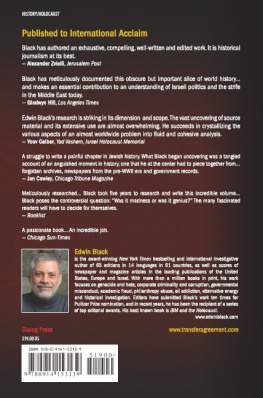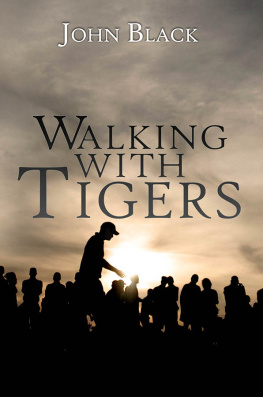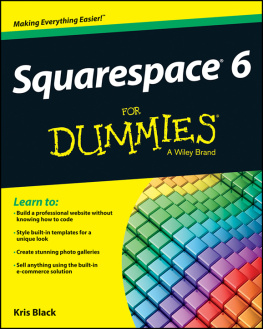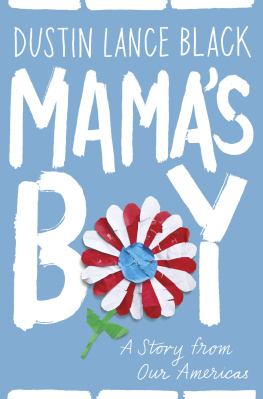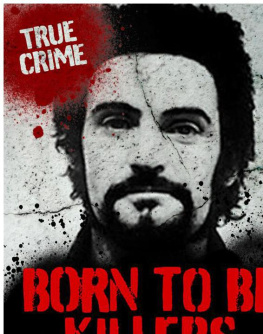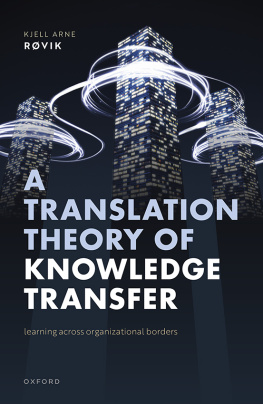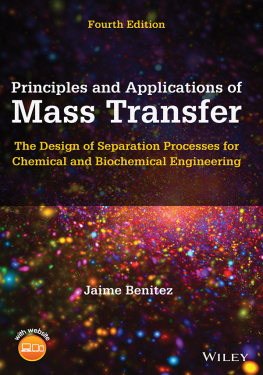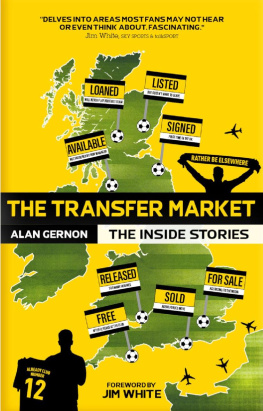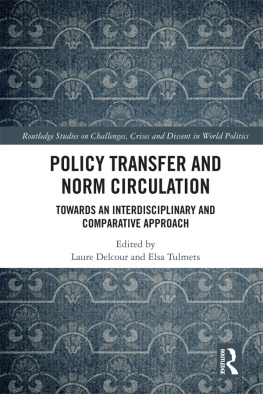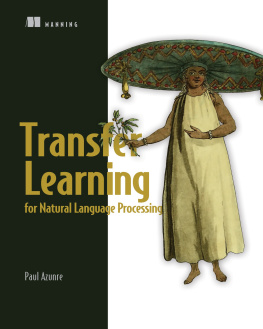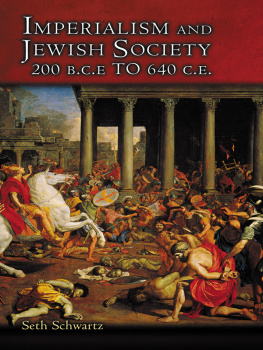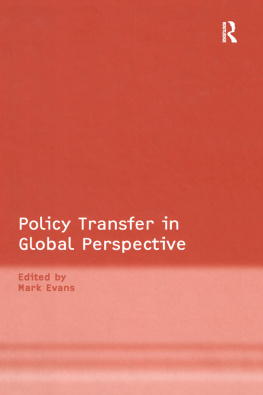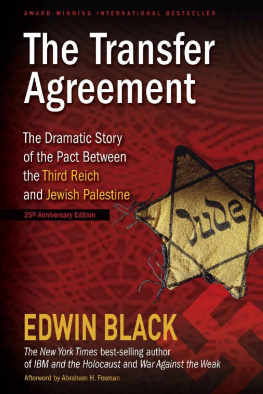What reviewers have said about
The Transfer Agreement
Black has authored an exhaustive, compelling, well-written and edited work. It is historical journalism at its best.
Alexander Zvielli, Jerusalem Post
Black has meticulously documented this obscure but important slice of world history, and makes an essential contribution to an understanding of Israeli politics and the strife in the Middle East today.
Gladwyn Hill , Los Angeles Times
Black reconstructs in depressing detail the strident debates and acrimonious struggleswhile pursuing the increasingly unrealistic goal of bringing the third Reich to its knees.
A.J. Sherman , The New York Times
A struggle to write a painful chapter in Jewish history. What Black began uncovering was a tangled account of an anguished moment in history, one that he at the center had to piece together fromforgotten archives, newspapers from the pre-WWII era and government records.
Jan Cawley , Chicago Tribune Magazine
Edwin Black applied his established investigative journalism techniques to history. The result is an extraordinary book, The Transfer Agreement .
Bill Kurtis , CBS Morning News
Meticulously researchedBlack took five years to research and write this incredible volumeBlack poses the controversial question: Was it madness or was it genius? The many fascinated readers will have to decide for themselves.
Booklist
Black brings an incredible amount of material together. With uncanny skill, he keeps it all under control. Five stars.
The Cincinnati Enquirer
A passionate book An incredible job.
Chicago Sun-Times
Outlines brilliantly the historic roots of German anti-Semitism.
The Denver Post
Five years of exhaustive researchthe undertaking was immense.
Dallas Times Herald
An exhaustively documented and compelling book.
Alan Borsuk , Milwaukee Journal
A well-documented, highly charged book that is likely to stir controversy.
The Baltimore Sun
Riveting.
Chicago Tribune Book World
Black in The Transfer Agreement seriously challenged orthodox views of history. Whereas many might see the Second World War as a struggle between good and evil, a history that is completely written and understood, Black paints a very different and more nuanced picture. His works suggest that Hitlers Germany was not only appeased by the West, but benefited financially and even ideologically from the United States, Europe and, as we have seen, the Jewish community in Palestine, even as the war was being fought.
Atticus Mullikin, European Journalism Centre Magazine
On one level, this book is an exciting spy story. On another, it is a heartbreaking account of anguished and bewildered human beings caught in a nightmare situation.
Present Tense
As a work of historical journalism, this book is exhaustive and compelling.
Ben Halpern, Moment
Edwin Black has succeeded beyond my hopes and expectations of doing justice to the Jewish protagonists of this dreadful and depressing history. He has not shirked his painful task but accomplished it in a compelling, enlightened and sympathetic way.
Robert Wolfe, National Archives
Truly a brilliant piece of work. It has captured the passion, ferocity, exultation and yes, naivet of that moment in history an artistic tour de force .
Morris Frommer, author,
The American Jewish Congress, a History
Excellent and revealing. Fills the vacuum in the history of both the German economy and of the Zionist movement. This book is informative, exciting, as well as challenging and morally disturbing.
Arthur Schweitzer, author, Big Business and the Third Reich
It reads like a good spy book, something out of John Le Carre.
Byron Sherwin, author, En countering the Holocaust
Acknowledgments to the 1984 Edition
Great projects are dependent upon two factors: money and people. I didnt have money, but I was blessed with wonderful, giving people. And so many of them became dear friends.
First, my translators and researchers; Gerald Bichunsky, who labored at my side in new York, Chicago, and Jerusalem, working Hebrew, Yiddish and English; George Zinnemann, who worked in French, German and English in Washington, Boston, new York, Miami and London, and who accompanied me to Munich, Bonn, Koblenz, and Berlin; Danuta Dombroska, who handled German, English, and Polish documents in Jerusalem; Gali Gur, who assisted in interviews, pored over the Hebrew and German documents and newspapers, and managed a team of twelve in Israel; Dan Niederland in Munich and Manfred Seyfried in Frankfurt, who worked with German materials; and Nathan Snyder of Austin, Texas, who translated hundreds of pages of Hebrew and German books.
Special thanks to my research assistants; Kathy Maass and Bradley Kliewer in Chicago.
A most vital part of the project was tracing back sources and checking details. That monumental task fell to Beryl Satter and others, who single-handedly triple-checked the accuracy of thousands of sources. This took fourteen grueling months of working full time for little pay.
In addition to those whom I recruited, there were many others who acted above and beyond, and without whose generous and sensitive cooperation the project would have been an impossible task. I speak now of archivists and librarians: Fannie Zelcer and Abraham Peck of the American Jewish Archives in Cincinnati; Richard Marcus of the Asher Library at Spertus College in Chicago; Robert Wolfe and George Wagner of the National Archives in Washington; Sybil Milton of the Leo Baeck Institute in New York; Sylvia Landress of the Zionist Archives in New York, Feiga Zilberminc of the Library of Congress in Washington; Helen Ritter and Ruth Rauch of the American Jewish Committee Archives in New York; Martha Katz-Hyman of the American Historical Society in Waltham; David Massel of the Board of Deputies Archives in London; Klaus Weinandy of the German Foreign Office and the Politische Archiv in Bonn; Shmuel Krakovsky at Yad Vashem Archives in Jerusalem; and Michael Heymann at the Central Zionist Archives in Jerusalem. These people reached out to assist me, and many of them gave me personal inspiration and understanding.
Of course, there were many other generous archivists too numerous to list here, but they as well have my special thanks. Libraries were also vital to my work because each library is distinguished by its own special collections and its own unique selection of publications from the period. Moreover, without the interlibrary loan program, I could not have worked with forgotten volumes suddenly discovered in distant cities but needed urgently. And so I give sincere thanks to the library staffs of Spertus College; Northwestern, Harvard, Columbia, and Roosevelt Universities; Hebrew Union College; the University of Bonn; the University of Frankfurt; the Israel National Library at Hebrew University; the University of Texas at Austin; the public libraries of Chicago, Boston, and New York; the American Jewish Periodical Center in Cincinnati; the Center for Library Research in Chicago; and the British Library in London.
Doors throughout the world were opened for me through the gracious help of many people. At the top of the list of those who helped is Rosemary Krensky, followed by Byron Sherwin, Sybil Milton, Robert Wolfe, Fannie Zelcer, David Kahn, Maynard Wishner, Carol Voss, and friends in the Israeli government. Once inside the doors, I needed guidance, and it was granted by many who gave me their time and expertise, including those mentioned above as well as Shaul Arlosoroff, Yehuda Bauer, Jack Boas, Ehud Evriel, Werner Feilchenfeld, Morris Frommer, Yoav Gelber, Moshe Gottleib, Ben Halpern, John L. Heineman, Yehiel Kudaschai, Abraham Margoliot, Dolf Michaelis, Justine Wise Polier, Arthur Schweitzer, David Yisraeli, and many others.

